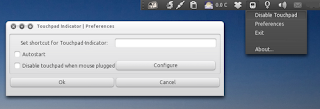Ubuntu developers made a desktop module of their own called Unity (although it still uses a lot of Gnome classic desktop "portions" such as Nautilus, Gconf, etc). Anyhow, because of the way the desktop is designed + to make things more efficient (according to them), the desktop is based on an application protocol called "application indicators" which has quite of A history to itself, already :) too.
Although I won't go into details since it ain't the purpose of this article. But the point is... Unity desktop has a top panel, which is similar to the Gnome classic desktop version but you cannot add any applets to it (which makes sense since it has to be kept "clean", otherwise it won't have enough room to draw the menus, etc).
So, if you use a Laptop or a Netbook then having the ability to change the brightness easily can come quite handy since it's one of those hardware devices that eat your battery-life. Thus, making manual adjustments do make a difference.
But the problem is, even though Gnome has an applet of its own for a long time now, but since Unity's dash is locked by default we just can't add those applets. So our only hope is to find an applet that uses the Ubuntu's "application indicators" protocol which runs in the system tray area (obviously).
Luckily thanks to a sensible dude from Codevanrohde.nl (or maybe a gal, I don't know! :D) now we have one!. It's an excellent little applet that lets us change brightness settings in Unity desktop with ease!.
Once you click on its icon, it'll display (as with the above screenshot) the brightness settings using numbers. The current brightness level is "marked" using a dot and just choose a higher or a lower number... as easy as that, it lets us directly access the monitor/display brightness.
Although it's designed for the Unity desktop, still you can use it in Gnome too because it runs in the system tray area. You can install this "indicator-brightness" in Ubuntu 11.04 Natty Narwhal by first downloading it from here and then simply double click on it and follow your on-screen instructions from the Ubuntu Software Center (yikes!).
You can make it to automatically start on each desktop startup by first,
1. Press "Alt" + "F2" keys and enter the below command and press enter.
Although I won't go into details since it ain't the purpose of this article. But the point is... Unity desktop has a top panel, which is similar to the Gnome classic desktop version but you cannot add any applets to it (which makes sense since it has to be kept "clean", otherwise it won't have enough room to draw the menus, etc).
So, if you use a Laptop or a Netbook then having the ability to change the brightness easily can come quite handy since it's one of those hardware devices that eat your battery-life. Thus, making manual adjustments do make a difference.
 |
| Ahh finally! :)... |
Luckily thanks to a sensible dude from Codevanrohde.nl (or maybe a gal, I don't know! :D) now we have one!. It's an excellent little applet that lets us change brightness settings in Unity desktop with ease!.
Once you click on its icon, it'll display (as with the above screenshot) the brightness settings using numbers. The current brightness level is "marked" using a dot and just choose a higher or a lower number... as easy as that, it lets us directly access the monitor/display brightness.
Although it's designed for the Unity desktop, still you can use it in Gnome too because it runs in the system tray area. You can install this "indicator-brightness" in Ubuntu 11.04 Natty Narwhal by first downloading it from here and then simply double click on it and follow your on-screen instructions from the Ubuntu Software Center (yikes!).
You can make it to automatically start on each desktop startup by first,
1. Press "Alt" + "F2" keys and enter the below command and press enter.
gnome-session-properties2. Then from the new window, click on the "Add" button and use the below information to fill it.
*. Name: indicator-brightnessThat's it.
*. Command: /opt/indicator-brightness/indicator-brightness.py
*. Comment: your ex-girlfriend's name (kidding :D... this is optional)
























